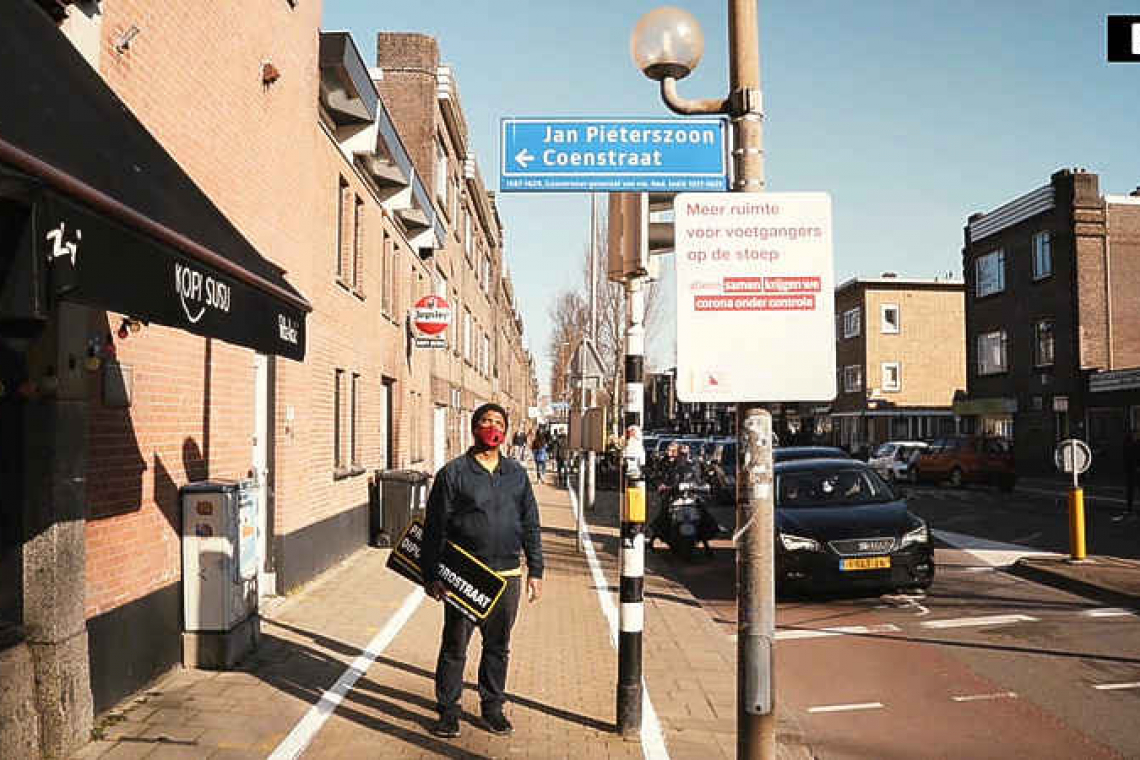BIJ1 number two candidate Quinsy Gario changed colonial street name signs in Amsterdam, Rotterdam, The Hague and Utrecht. (Photo by Ruben Hamelink/BIJ1)
AMSTERDAM--Candidate for the BIJ1 party in the elections for the Second Chamber of the Dutch Parliament, Quinsy Gario took an eye-catching action last week: he changed colonial street name signs in four major Dutch cities.
Gario of St. Maarten/Curaçao and number two on the BIJ1 slate, went to Amsterdam, Utrecht, The Hague and Rotterdam where he changed street name signs of oppressors who actively participated during the Dutch colonial times, such as Jan Pieterszoon Coenstraat in Utrecht and Witte de Withstraat in Rotterdam.
Gario and his team put new street name signs over the existing signs. The “new” street names honour anti-colonial freedom fighter Prince Diponegrostraat in Utrecht, victim of police violence, Tony Holtenstraat in Amsterdam, but also call for the recognition of racism with Witte Onschuldstraat (“White Innocence Street”) in Rotterdam and the importance of colonial reparations with Herstelbetalingenstraat (“Repair Payments Street”) in The Hague.
Gario explained why it is so important not to see colonial street names as a problem from the past, but as an urgent current issue in the fight for equality. “You can see them every day, on the public street: colonialism is still not part of the past. Colonies of the past are still being exploited by the global north. We need a culture change, a political change,” he said.
BIJ1 on Monday filed a formal complaint of threats, in particular against party leader Sylvana Simons. As a left-wing party with a black woman as party leader, BIJ1 receives a lot of online hate mail and threats. According to the party, this is a social problem which needs to be halted.
Together with Reporting Centre for Discrimination, Amsterdam Region, BIJ1 has made a formal report with a selection of hate mail and other threatening messages. However, only one of these messages will be eligible for prosecution. “The process of this complaint says a lot about the lack of legal protection. We need to be truly concerned as citizens, with this government,” said Simons.
BIJ1 has received thousands of hateful private messages, comments, emails, posts and tweets, which are generally racist, sexist or anti-gay, and often contain a concrete threat. The 52 messages that the party has selected for the formal complaint are merely the tip of the iceberg. Actually, the gathering and selection of the most severe messages is the work of police and justice, but in this case the Reporting Centre lent a helping hand.
BIJ1 wants to make the filing of formal complaints matter. “We need to talk about the boundaries that we consider to be normal and move these in the right direction. Until that time, we need to remain brave enough to speak against this injustice,” said Simons.







